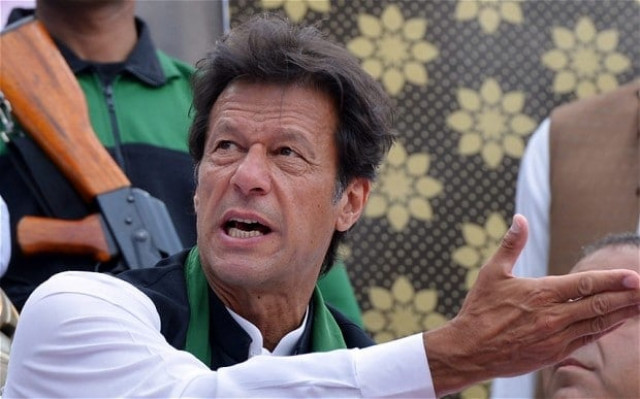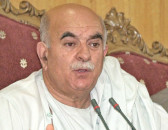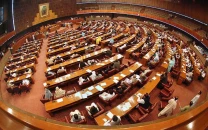Admitted, undisputed facts yield a decision: CJP
Remarks come as petitioner’s counsel asks top court to uphold equity and justice in view of ex-PM’s...

PTI chairman Imran Khan. PHOTO: AFP/FILE
The remarks came on Wednesday during the hearing of a petition filed by Hanif Abbasi of the ruling PML-N, seeking disqualification of PTI chief Imran Khan.
The chief justice was replying to Akram Sheikh, the petitioner’s counsel, who had asked the Supreme Court that principles of equity, equality and justice must be protected in the wake of the announcement of the July 28 judgment whereby former prime minister Nawaz Sharif was disqualified for concealing assets.
“In Friday’s judgment [against the ex-PM], the court rendered a verdict and now the people of Pakistan are looking for equity. In all honesty and fairness, the court has to protect the principle of equity, equality and justice,” said Akram Sheikh before the three-judge bench of the top court.
However, Justice Nisar, who heads the bench, remarked that they were mindful as under Article 184 (3) of the Constitution, the Supreme Court only decided cases on the basis of admitted facts. He told the counsel that it was yet to be clarified whether the nature of facts submitted by him in the foreign funding case were admitted or not.
He also asked him to point out undisputed facts and submit evidence to substantiate that PTI received funds through prohibited sources. “On which basis the certificate submitted by PTI chief be declared false and he should be disqualified under Article 62 (1)(f),” he observed.
Justice Umar Ata Bandial, a member of the bench, also asked the counsel that he wanted to hold the principal i.e. Imran liable for the funds which were not deposited in his account by the agent who collected them in the US.
SC cannot disqualify Imran Khan for submitting false declaration under PPO: CJP
Sheikh, however, said if the court believed that facts were disputed, then the matter of prohibited funds should be investigated, adding that if this trend was not stopped, a floodgate of foreign funding in political parties would open up. He said that the PTI got around 40,000 dollars from multi-national companies.
He also said that holders of dual nationality did not cease to be foreign nationals, and foreigners cannot make funding to a political party. However, the bench said that there were two judgments, in which the court had accepted their right of vote.
Meanwhile, the PML-N leader’s counsel contended that despite the Supreme Court order, Imran had not submitted a complete bank statement of his offshore company, Niazi Services Limited (NSL), founded on May 10, 1983 and wound up in 2015.
Justice Bandial wondered why the PTI chief did not shut down his offshore company even 10 years after selling off its assets. He also asked how it could be established that the NSL had no assets owned in its name after the sale of Imran’s London flat.
The counsel argued that Imran himself had admitted that he was the beneficial owner of the NSL. However, the chief justice observed that the PTI chief was not the ‘legal owner’ of the company.
He also asked PTI chief’s counsel Naeem Bukhari to submit complete travelling records to prove that he was a non-resident in that particular period.
Sheikh said although the PTI claims that upon the sale of the London Apartment, the NSL became a shell company, but a shell company is an asset.
He contended that omissions to make a true statement of assets and liabilities highlighted above “cover the same kind of facts that are required to be disclosed in the wealth statement under the income tax laws as well as statements to be filed under the Wealth Tax Act of 1963 (Repealed in 2003)”.
Maryam Nawaz ‘beneficial owner’ of London flats
As far as the Wealth Tax Act is concerned, the respondent i.e. Imran was obliged to declare his beneficial ownership of the London Apartment, he said, adding that Imran had been a resident taxpayer since 1981-82, and was directed by the court to provide copies of all income and wealth tax returns.
Sheikh contended that Imran claimed that he availed CBR’s Tax Amnesty Scheme of 2000 and declared the London Apartment as an un-disclosed source of income.
“It is submitted that the London Apartment did not directly belong to Imran Khan in his status as an Assessee taking the benefit of the scheme. The benefit of the same was not available to NSL, while the London Apartment itself was registered in the name of NSL. Imran Khan obtained the benefit of the scheme by making a false declaration regarding recorded title to the property,” he told the court.
According to Sheikh, immunity under the scheme extends only to tax liability, and there is no immunity on other liabilities such as making a false declaration in the wealth tax returns, clearly establishing that Imran was neither ‘sadiq’ nor ‘ameen”
“The facts of the case clearly establish that the PTI chief consistently made false and misleading statements in declarations filed with the ECP in nomination papers as well as declarations made in the Income Tax and Wealth Tax records. Imran Khan is, therefore, clearly neither ‘sadiq’ nor ‘ameen’ nor a “righteous” person. This fact is established from the admitted record placed before this court. Therefore, he is not competent to remain an MNA,” he argued.
The case continues today (Thursday).



















COMMENTS
Comments are moderated and generally will be posted if they are on-topic and not abusive.
For more information, please see our Comments FAQ